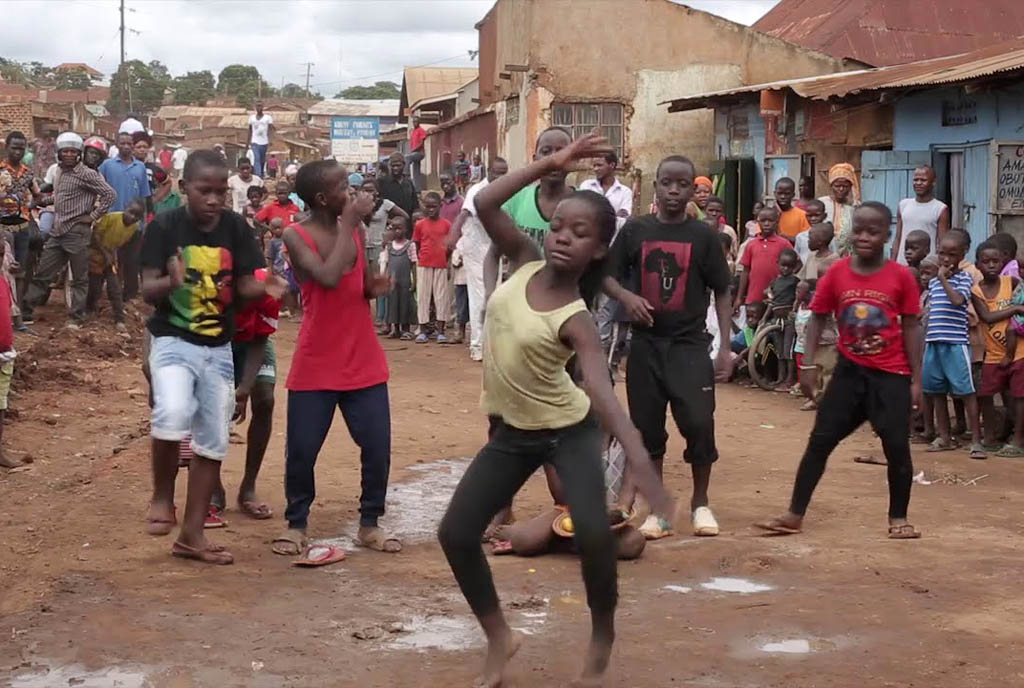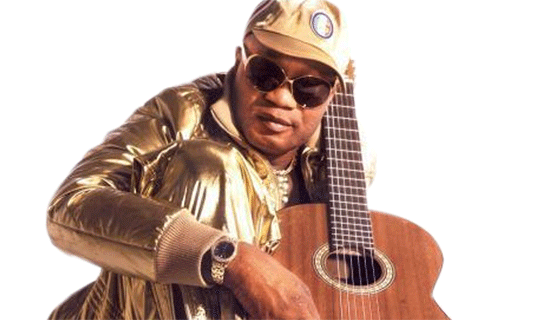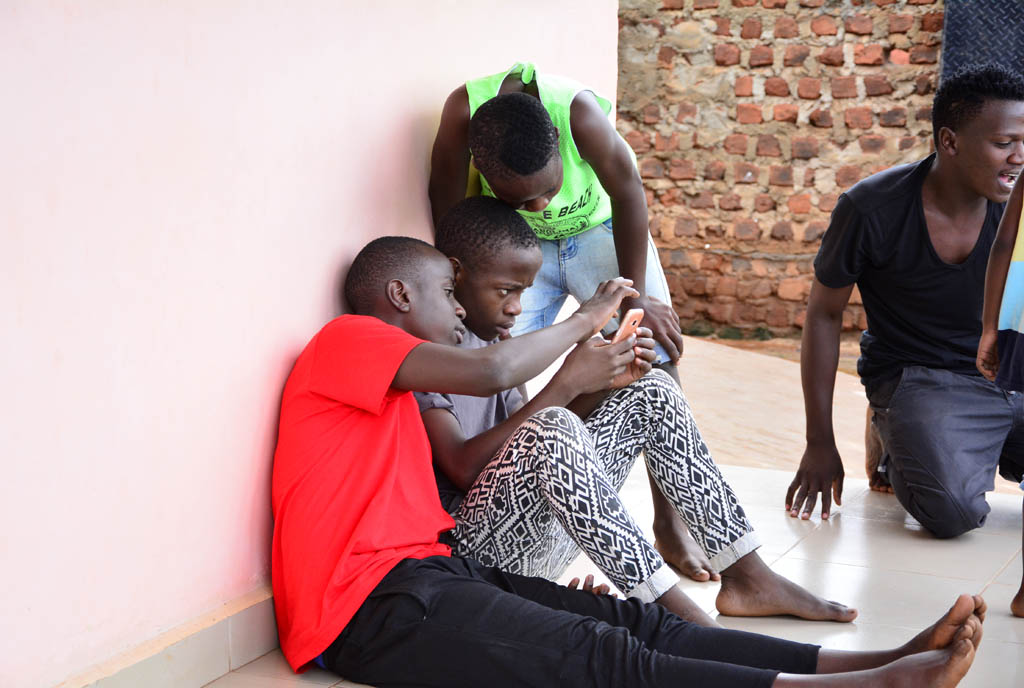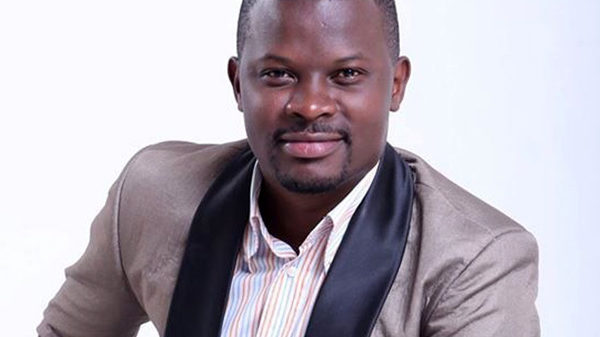
A video grab of The Gheto Kids dancing to French Montana Feat. Swae Lee’s “Unforgettable” song. Photos by Dominic Bukenya/Courtesy
For many, when you hear of The Ghetto Kids, the first thing that comes to your mind are the kids in Eddy Kenzo’s “Sitya Loss” video. But there’s a lot more behind them. We found that out when we visited them on a rainy Sunday morning at their home in Makindye.
Before you get into the compound, there’s someone in charge that has to be consulted before the gate is opened. After the approval from the boss of the house, the gate is opened and you walk into a super clean compound with kids all over the place. Their manager Kavuma Dauda walks out to greet us and the interview begins.
Sqoop: This house is too organised, are you always this prepared?
Dauda Kavuma: Ha ha no chance!
Sqoop: You sound like an educated man. No offence!
Kavuma: I am a teacher by profession.
Sqoop: Names please:
Kavuma: Kavuma Dauda.
Sqoop: Dauda you are not married.
Kavuma: I am so married. I have a wife Kavuma Sarah and three children. Ashley, Alim and Aban Kavuma.
Sqoop: Let’s get to why we came here. The Ghetto Kids. We initially came to talk to them but you are the boss, let’s talk to you first. Who are the Ghetto kids, where and when did this idea come up?
Kavuma: They are called the Triplets Ghetto Kids but now we refer to it as the Triplets Ghetto Kids Foundation. It all started years ago. I am an orphan. My father died when I was in P4. One day I was playing football when this man – I still remember his name “Kaita Musa” I had never seen him before – he saw me control a ball and that was the beginning of it all. He called me to the side and asked me if I was in school. I told him I wasn’t. He asked if I wanted to go to school. I of course said yes wondering what it was all about, then he told me to go to a certain school. When I got there, everything I needed for school was given to me and from that day I swore to one day help someone when I grow up. That’s where I got the thought and heart.
From there I studied and became a professional mathematics teacher but also had a huge interest in music and drama.
I was earning Shs60,000 as a teacher at Citizens Parents Makindye when I started this project. I had a one-room house that was given to me by the school. I met this woman that is my wife now [he smiles like he can’t believe she stuck with him] and I think what kept us together was that she was interested in my dream. That’s how it all started. Then in about 2009, I picked up three kids, they were all at the same age (around 10) all from different ghettos. The late Alex from Spire in Ndeeba. Right now it’s being demolished. Then Nabate Sylvia from a ghetto in Nabisalu and Nansubuga from Lusaka in Makindye. That was the beginning of The Ghetto Kids.
I now have about 25 kids. I stay with 18 kids at my house here. There’s four that stay with their mother, Nalongo in a ghetto in Kasanga, then Alex’s two siblings. I also have Nickolas but most know him as Lubuto. He is the boy that you see in those YouTube videos attacking and abusing Museveni. He is an interestingly smart boy.
The eldest in the group are three, Ssentogo Ronald, Sellu Hassan and Nabate Sylvia; they are 15/16 years old. The youngest is one of my three children and the last born, my daughter Kavuma Ashley. She is six years old.
Sqoop: So what kind of kids qualify to be here?
Kavuma: I help street kids, ghetto kids and kids from vulnerable families. For the street kids, I randomly land on one or they come to me. I talk to them and persuade them to come and stay with us. I show them around and the life they could live besides what they are living now and watch how it goes. Sometimes I fail to convince them and they go back to the streets after a few days. Sometimes they stay and sometimes they go and come back.
For the ghetto and the unprivileged kids, I talk to their parents and agree with the kids and parents that if they come and join us I will take full responsibility of the kids which means I will educate them, dress, feed them and literally become their parents but with the help of their parents as well.
Sqoop: Do they sign contracts to be here?
Kavuma: None of these kids has a contract with me. All we have is an understanding and verbal agreement to help each other into a better life.
Sqoop: So you make the money through them and take care of them?
Kavuma: The money we make is for the foundation, not the kids and not mine.
Sqoop: From three kids to now 25, that’s a big dance group.
Kavuma: Not all of them are performers. I have nine performers that is Nyangoma Lucia, Ssentogo Ronald, Lubegga Bashir, Sselubu Hassan, Wasswa Hassan (mani King) Tussime Isaac, Tumwesigye Fred, Kavuma Ashley and Babirye. The others are not performers, they are in school.
Sqoop: So it’s the nine that get paid?
Kavuma: No one gets paid here; we take care of each other from the earnings. Agreement is if one of them becomes a lawyer he becomes our lawyer.
Sqoop: So how do you split the earnings?
Kavuma: For starters, these nine performing artistes all have accounts but my target is for all the 25 to have accounts and the aim is that by the time they are 18 each has at least between $3,000 to $5,000 to help them kick start whatever path they choose. That’s for the performers. For the other kids who are not performers, the earnings help with their school and up keep and we support their parents once in a while when there’s need.
Sqoop: School for the others is easy but how about the performers who have to travel, don’t they miss school?
Kavuma: For the performers because sometimes they travel mid-way the school term, we put them in two school formats. They are on the Ugandan syllabus when they are in the country and when they travel they shift to international home schooling so that they don’t miss out on school while on the road.
Sqoop: Now these are kids; some are humble and behaved then the others, chaos. How do you deal with them?
Kavuma: Disciplining and keeping them in line is the biggest challenge. These are kids that never thought of being where they are and on top of that they are now “celebrities”. We go to Europe and the attention is overwhelming. They meet “celebrities” see people cry at their performances and it gets to them so my biggest challenge is to manage their expectations, keep them grounded and focused and make sure they don’t get carried away by stardom.
Like in any setting they have many disagreements. I try to talk to them as much as I can. This house has rules but being kids they still misbehave but the biggest is fights within themselves. I have two boys here; they are blood brothers but are always fighting each other meanwhile over a charger, or case, socks, minor things. Now see that one [points at one of brothers]. He has a bandage on his arm from the fight. Thing is I can’t chase any of them; it’s not an option for me. Once they are in I am stuck with them.
Sqoop: What happened to Alex, How did the parents react?
Kavuma: Yeah, Alex [he bows his head down sadly] You know kids. One minute they are in your sight, next thing you can’t find them. That’s what happened to Alex but I was so lucky with Alex’s parents. I left Alex at home, they went out to ride a bike just like any child and the next call I got was “your kids got into an accident” and sadly Alex passed on. It was a sad moment, the parents were understanding because we had been together through a lot. It took us all some time to recover but as a family we took the oath to take the dream further in his name.
Sqoop: How did you get to Eddy Kenzo? He is the beginning of your fame isn’t he?
Kavuma: Yes he is. we met Eddy Kenzo in 2010, We went for his show when “Stamina” was a hit and I told the late Alex “go to the stage and dance the Stamina Dance”. All we were looking for was some bit of fame and Alex did a good Job, He is the beginning of it all. Kenzo liked Alex a lot from there and asked that we dance to one of his videos like “Mudenke” and that’s how we started. Later on we asked him to give us a song to dance to and he gave us two songs. “Champagne” and “Sitya Loss”, We chose the latter. Later he called us and we shot the video in Nsambya and next thing I knew people were calling me, telling me the video had gone viral. Honestly I didn’t know what viral or YouTube meant so I ignored it then. Then came the calls from journalists, promoters and people who wanted the kids to dance at their events.
Sqoop: Then came the fame after you went for the Ellen Degeneres Show. How did that go?
Kavuma: Kenzo handled the Ellen thing. Many people think we have met Ellen but we have never. Kenzo and DJ Din a Blogger that shared our “Sitya Loss” video that viral were the ones in control by then. Honestly I didn’t know Ellen or YouTube and I didn’t think it was worth anything really. Something happened and we never went for the show yet we were meant to. I don’t really know what happened but now because of the Montana video the idea has been resurrected and we are in talks with the Ellen DeGeneres show managers to go for the show. Hopefully this time it happens.
Sqoop: Is that the reason you split from Eddy Kenzo?
Kavuma: We didn’t split from Kenzo, We have no problem with Kenzo. Like in any relationship we have had our fall outs. With the Ellen thing and The Coca Cola Deal “Reasons to Believe – Africa”, they approached us from Swangz Avenue with a link from Ogilvie, a company in Kenya. They wanted a few minutes from our “Sitya Loss” video but when I told Kenzo of the deal he disagreed and said they should contact him and not us. But the video rights belonged to the Triplets Ghetto foundation so we went ahead and did the video. We disagreed a bit but he eventually got over that.
Sqoop: How did you make contact with French Montana?
Kavuma: Still DJ Din the Ugandan Blogger in Sweden spread one of the kids videos “Follow Follow” by Hanisson Baliluno. In America it was huge and Montana watched it, liked it and felt the dance moves flowed with his new song and that’s how Montana’s manager got in touch. He wanted to shoot the video so fast and wanted us to go to America but because of the expenses and visa issues he decide to travel and shoot the video here. When he got here, he asked we shoot the video in a ghetto where the kids come from so we took him to Spire in Makindye where the late Alex comes from.
Sqoop: How are the earnings spent, who gets what?
Kavuma: When we travel, like we did recently. We had a European tour, we went to Australia for about a month. We were six people that travelled. Five performers and the manager. The promoter spent about Shs30m on tickets alone without the domestic flights in between so that’s always the downside of a big group. As Kenzo, he travels alone or with the manager and the earnings are a lot more but with us because we are a big team we spend a lot on accommodation, food but we still make some money. Always when we are travelling back, it’s the six people that travelled and literally made this money but here we are a family and I encourage a sharing culture so we have to buy each other something and their parents if possible from our travel earnings. So yes we make money and we are grateful but when you look at our combined expenditure we really don’t save a lot but at least it keeps us going and getting to a better place every day.
Sqoop: What’s the vision of “Triplets Ghetto Kids Foundation”?
Kavuma: I want us to one day to have our own big school and place where unprivileged kids from the street and ghettos can come and learn and hopefully make a difference in their lives. Helping is heart, it’s not about the money. There’s a man called Patrick Shara. He is taking care of an elderly person in the USA but he is one of our sponsors. He doesn’t earn a lot but he told me whenever we need help I should call him and he will help and he always does. There’s another one Fredrick helping Patricia and Ashley. They are many rich people out there that can barely help a child.
Sqoop: Any last words?
Kavuma: I urge Ugandans to not just talk about the unprivileged children in the country. I have never been rich but I have had a direct influence and difference in the lives of 25 kids. I believe we can do more.




































































